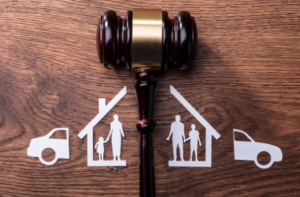
With all the emotional turmoil involved, it is often the couple's financial plans that can be overlooked potentially leading to long term consequences for all involved.
Obtaining a divorce can be a straightforward legal process but on the other hand when there are children, a jointly owned business or international issues involved then a divorce can be a very complex process, needing sound professional advice.
How does divorce work?
A couple must be married for at least one year before they can get divorced. If both partners agree to a divorce and the reason why, then they do not need the services of a solicitor or attend court.
If both partners can agree to a divorce (including the reason why), then the divorce will usually take between 4 and 6 months to finalise. It could take longer if there are issues regarding finances or children that will have to be dealt with separately.
If one partner contests the divorce they will be required to detail the reasons why they are defending a divorce. There are a variety of reasons why someone might contest the divorce, they might not agree that the marriage has broken down irretrievably or they might dispute the grounds for divorce outlined by their spouse.
There are five possible grounds for divorce, listed below:
- adultery
- desertion
- two years of separation (with the consent of the respondent)
- five years of separation (without the consent of the respondent)
- unreasonable behaviour
In contested divorces, the court will require both parties to provide evidence to support their case. Once they have done this, a judge will determine whether or not the spouse who petitioned for divorce is entitled to it.
How are assets split in a divorce?
Splitting assets on divorce can be a complex affair and can be split differently in each divorce. However, section 25 of the Matrimonial Courses Act 1973 sets out some basic guidelines that apply when deciding financial claims regarding property, pensions, savings and maintenance. The court can also make reference to decisions made in previous divorce cases, known as case law. When making any decisions it is the duty of the court to give first consideration to the welfare and needs of any dependent children.
There are a number of areas to be considered by the court in making their final decision, such as:
- Income - financial resources available to each party both now and in the foreseeable future
- Financial obligations - obligations and responsibilities of each party both now and in the foreseeable future
- Standard of living enjoyed before the marriage breakdown
- Medical needs of both parties
- Contributions to the welfare of the family including looking after the home and children
- Pensions and other assets that either party will lose the chance to acquire in the future
What happens to my pension if I get divorced?
The details of all pensions must be declared in your financial statement if you divorce or dissolve a civil partnership. The court will then deal with your pension in one of the following ways.
- one partner is given a percentage of the former partner's pension pot
- value of the pension pot is offset against other assets
- some of the pension is paid to a former spouse or civil partner, known as pension attachment, and can also include part of any tax-free lump sum
What happens to my state pension if I get divorced?
Basic State Pension
If you are entitled to a basic state pension it cannot be shared if you are granted a divorce but divorced couples can use the National Insurance contributions of the former spouse or civil partner to increase their state pension. Doing this will not reduce the amount of state pension the other person receives. Importantly, these rights are lost if you remarry or enter into another civil partnership.
New State Pension
If you are entitled to a new State Pension it cannot be shared if you get a divorce. If you have a ‘protected payment’ (an additional payment you may get on top of the full state pension), then the court could order that this is shared with a spouse or civil partner.
How much does a divorce cost?
The overall cost of a divorce will depend on whether the divorce is uncontested or not, how complicated the financial arrangements and whether there are any children from the marriage or civil partnership.
If the divorce is uncontested then the solicitor's fees are lower and for the petitioner (person seeking a divorce) they would be in the region of £500 - £1,000. In addition, there is a divorce centre fee of £550 bringing the total cost to around £1,500. The other party in the divorce would only pay solicitor's fees of around £500.
If the divorce is contested and the financial situation complex then the costs could escalate substantially as often seen in high profile divorce cases.
Should you get financial advice on divorce?
Getting divorced does not have to be an expensive exercise if the divorce is uncontested, however, dealing with the financial arrangements can be complex and expensive if agreement cannot be reached. Most couples will start the divorce proceedings by visiting a solicitor and if a financial agreement cannot be reached amicably will quickly find the legal costs escalating.
A much better way of approaching a divorce is for both parties to discuss their future financial arrangements openly and honestly and seeking advice at this time could prove invaluable. I would strongly suggest seeking the services of an independent financial adviser if you own property, a business, have any children or stepchildren or pensions and investments. If you require the services of a financial adviser, then you may find our article on 'How to find a good financial adviser' useful.
What happens to my will if I get divorced?
If you live in England or Wales and had made a Will whilst married, a divorce will have an impact on the Will. While the Will remains valid after divorce, your ex-spouse would no longer be entitled to benefit from it, unless of course you expressly stated otherwise.
The ex-spouse would also no longer be permitted to act as an Executor or Trustee of your estate. Once the divorce has been finalised, anything gifted to your ex-spouse in your Will would be dealt with as though they had died on the date that your marriage was officially ended. Therefore, whatever they were set to inherit would be passed on to the next beneficiary, in line with the terms of the Will.
For more information on Wills, check out our article 'What is a Will and how to get one'.
How can getting financial advice help in a divorce?
One of the first steps in reaching a financial settlement in a divorce is for both parties to disclose their respective financial positions. This is known as 'exchanging financial disclosure'.
Information on assets, income, and liabilities are usually exchanged through a financial statement known as a ‘Form E’ which is a comprehensive form setting out details on the following:
- valuation of any property and outstanding mortgage
- bank accounts and investment values
- life insurance and pension values
Whilst this is a form that can be completed without recourse to a financial adviser it may be prudent to engage their services of an independent financial adviser to ensure both full disclosure and accurate valuations are made.
Once financial disclosure has been completed, an independent financial adviser can assist with agreeing on a settlement and implementing it.
Once the divorce has been completed there may be a number of financial issues to be resolved and an independent financial adviser can provide advice in any of the following areas:
- remortgaging a property to enable the release of a lump sum or to purchase another property
- splitting existing pensions or arranging new pensions
- arranging life insurance or other insurance products
- advising on wills
I would also strongly advise reading our article - How to find an independent financial adviser - which provides a comprehensive review of the role of an independent financial adviser together with details of some useful websites to help you find one in your area.
If you are thinking of getting a divorce you will find the following two websites very useful:
Gov.UK Get a divorce: step by step
Citizens Advice - Getting a divorce




